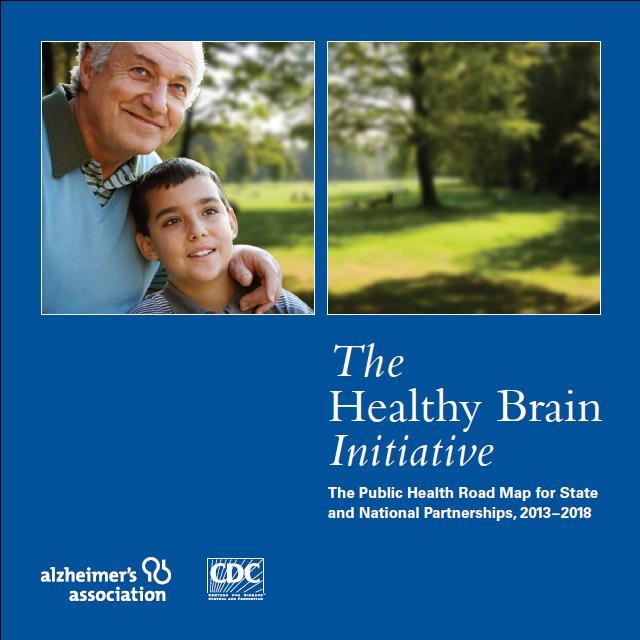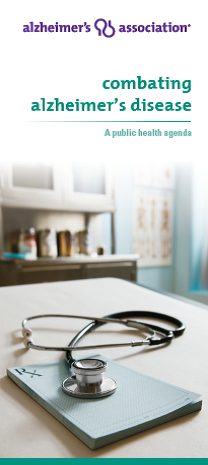One in Nine Adults Experiencing Subjective Cognitive Decline
 In 2015, one in nine Americans aged 45 and older, experienced subjective cognitive decline (SCD) – that is, they reported experiencing increased confusion or worsening memory loss over the previous 12 months. And, those cognitive problems had a negative impact on everyday life – 40.5 percent had to give up household activities and chores due to their SCD, and 36.5 percent said that SCD interfered with their ability to work, volunteer, or engage in social activities. These data come from a new analysis – conducted by the Centers for Disease Control and Prevention’s (CDC) Healthy Aging Program – of the Cognitive Module from the 2015 Behavioral Risk Factor Surveillance System (BRFSS). In 2015, one in nine Americans aged 45 and older, experienced subjective cognitive decline (SCD) – that is, they reported experiencing increased confusion or worsening memory loss over the previous 12 months. And, those cognitive problems had a negative impact on everyday life – 40.5 percent had to give up household activities and chores due to their SCD, and 36.5 percent said that SCD interfered with their ability to work, volunteer, or engage in social activities. These data come from a new analysis – conducted by the Centers for Disease Control and Prevention’s (CDC) Healthy Aging Program – of the Cognitive Module from the 2015 Behavioral Risk Factor Surveillance System (BRFSS).
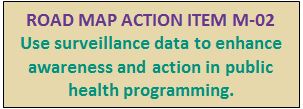 A growing body of evidence shows that SCD is one the earliest warning signs of future cognitive impairment, including Alzheimer’s disease. Individual fact sheets are now available for the 35 states and territories that used the Cognitive Module in their 2015 BRFSS surveys. With these new data, states can see the scope and burden of SCD as well as whether those individuals are talking to a health care provider about their memory problems. A growing body of evidence shows that SCD is one the earliest warning signs of future cognitive impairment, including Alzheimer’s disease. Individual fact sheets are now available for the 35 states and territories that used the Cognitive Module in their 2015 BRFSS surveys. With these new data, states can see the scope and burden of SCD as well as whether those individuals are talking to a health care provider about their memory problems.
We encourage you to download your state’s fact sheet not only for your own use, but to distribute to health officials, public health practitioners, and state policymakers. Tweet the fact sheet, link to it on your website, blog about it. Data are only useful when used to inform policy and systems change, and that can only happen if the data are widely distributed.
Reminder: Upcoming Webinar on 2015 BRFSS Data
 Be sure to join us on Wednesday, December 14 from 3:00-4:00 p.m. EST for an in-depth discussion on How Increasing Memory Problems Impact Daily Life – Recent CDC Findings from the 2015 Cognitive BRFSS. Be sure to register online in advance (use meeting number 749 037 448 if prompted). Be sure to join us on Wednesday, December 14 from 3:00-4:00 p.m. EST for an in-depth discussion on How Increasing Memory Problems Impact Daily Life – Recent CDC Findings from the 2015 Cognitive BRFSS. Be sure to register online in advance (use meeting number 749 037 448 if prompted).
Dr. Lisa McGuire, Team Lead of the Healthy Aging Program, will present the aggregated results of the 2015 Cognitive Module, and three of the program’s analysts will highlight the burden of subjective cognitive decline on adults aged 45 and older as well as the extent to which they have discussed these problems with a health care provider. Sallie Thoreson with the Colorado Department of Public Health and Environment will provide a state-level perspective on the data and share her department’s plans to use the BRFSS data.
Research Suggests Decline in Dementia Prevalence Rate
 Improved education and better management of heart health risk factors may have contributed to a lower prevalence rate of dementia in the United States, according to a new report published in JAMA Internal Medicine. The percentage of seniors with dementia in this study decreased from 11.6 percent in 2000 to 8.8 percent in 2012. This new research reinforces the growing scientific consensus that modifying certain behaviors can help promote brain health throughout adult life and may lead to a reduced risk of Alzheimer’s or dementia. While this study may indicate a declining rate of dementia, the total number of people living with dementia will continue to surge with the aging of the US population. And, as the authors of the study noted, the trends may reverse in the future, given the high number of middle-aged Americans with diabetes and obesity -- believed risk factors for dementia. Improved education and better management of heart health risk factors may have contributed to a lower prevalence rate of dementia in the United States, according to a new report published in JAMA Internal Medicine. The percentage of seniors with dementia in this study decreased from 11.6 percent in 2000 to 8.8 percent in 2012. This new research reinforces the growing scientific consensus that modifying certain behaviors can help promote brain health throughout adult life and may lead to a reduced risk of Alzheimer’s or dementia. While this study may indicate a declining rate of dementia, the total number of people living with dementia will continue to surge with the aging of the US population. And, as the authors of the study noted, the trends may reverse in the future, given the high number of middle-aged Americans with diabetes and obesity -- believed risk factors for dementia.
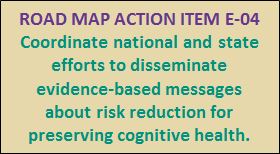 Public health practitioners can help promote brain health and healthy aging by disseminating risk reduction information throughout their communities, as recommended in the Public Health Road Map. Jointly developed by the Centers for Disease Control and Prevention’s Healthy Aging Program and the Alzheimer’s Association, the Road Map is a guidebook for public health officials to address cognitive impairment and Alzheimer’s disease and to support caregivers. Consider incorporating these brain health messages into existing risk reduction campaigns about exercise, smoking, diabetes, and several others. Public health practitioners can help promote brain health and healthy aging by disseminating risk reduction information throughout their communities, as recommended in the Public Health Road Map. Jointly developed by the Centers for Disease Control and Prevention’s Healthy Aging Program and the Alzheimer’s Association, the Road Map is a guidebook for public health officials to address cognitive impairment and Alzheimer’s disease and to support caregivers. Consider incorporating these brain health messages into existing risk reduction campaigns about exercise, smoking, diabetes, and several others.
Guidance and Resources on Needs Assessments Related to Alzheimer's and Other Dementias
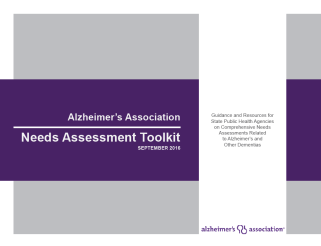
Comprehensive needs assessments are at the core of a state’s ability to effectively use information to develop, implement, and maintain state plans that are focused on Alzheimer’s and other dementias. Such assessments also can enable the incorporation of cognitive health and impairment into other state public health plans. To help state public health agencies, the Alzheimer's Association has developed a needs assessment toolkit to help states leverage their expertise in conducting needs assessments to enhance their ability to gather and use information specifically related to Alzheimer’s and other dementias.
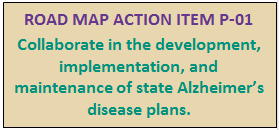 This toolkit is framed around a series of six steps — Partner, Plan, Assess, Synthesize, Envision, and Communicate. Each step details how states can plan and conduct needs assessments to identify and respond to those with Alzheimer’s and other dementias as well as their caregivers. This toolkit is framed around a series of six steps — Partner, Plan, Assess, Synthesize, Envision, and Communicate. Each step details how states can plan and conduct needs assessments to identify and respond to those with Alzheimer’s and other dementias as well as their caregivers.
For additional information or assistance using the toolkit, please contact Molly French (mfrench@alz.org).
Disasters May Negatively Impact Long-term Cognition
 Japanese seniors who were displaced from their homes and who lost contact with their neighbors after the 2011 tsunami were more likely to experience symptoms of dementia than those who were able to safely stay in their homes, according to a new study published in Harvard University’s Proceedings of the National Academy of Sciences. Utilizing an ongoing community survey, researchers found that seven months before the tsunami, only 4.9 percent of participants displayed dementia symptoms. When researchers followed up with all study participants two-and-a-half years after the tsunami, 11.5 percent reported dementia symptoms. Those whose homes were severely damaged or destroyed experienced more cognitive problems. Japanese seniors who were displaced from their homes and who lost contact with their neighbors after the 2011 tsunami were more likely to experience symptoms of dementia than those who were able to safely stay in their homes, according to a new study published in Harvard University’s Proceedings of the National Academy of Sciences. Utilizing an ongoing community survey, researchers found that seven months before the tsunami, only 4.9 percent of participants displayed dementia symptoms. When researchers followed up with all study participants two-and-a-half years after the tsunami, 11.5 percent reported dementia symptoms. Those whose homes were severely damaged or destroyed experienced more cognitive problems.
The authors note that in the aftermath of a disaster, much of the focus is on mental health issues such as post-traumatic stress disorder (PTSD), but this study indicates that disasters may also speed up cognitive decline among vulnerable older people.
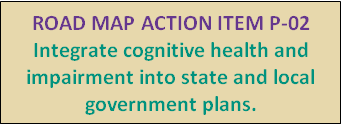 Research like this reinforces the need for communities to incorporate the special considerations of people with cognitive impairment in their disaster preparedness planning. This annotated bibliography can help public health agencies adequately and appropriately incorporate considerations for people with cognitive impairment or dementia into state disaster plans. Consider using this bibliography with the above needs assessment toolkit. Research like this reinforces the need for communities to incorporate the special considerations of people with cognitive impairment in their disaster preparedness planning. This annotated bibliography can help public health agencies adequately and appropriately incorporate considerations for people with cognitive impairment or dementia into state disaster plans. Consider using this bibliography with the above needs assessment toolkit.
In Case You Missed It: Resources for Risk Reduction and Public Health Education
 A webinar on the importance of controlling certain cardiovascular risk factors to help reduce later-life risk of stroke and possibly dementia is available from the Society for Public Health Education’s (SOPHE) community of practice on healthy aging. The video was created in conjunction with the National Institutes of Health’s Mind Your Risk Campaign, a national effort to help disseminate information and tips about stroke and dementia risk reduction, and the Alzheimer’s Association. A webinar on the importance of controlling certain cardiovascular risk factors to help reduce later-life risk of stroke and possibly dementia is available from the Society for Public Health Education’s (SOPHE) community of practice on healthy aging. The video was created in conjunction with the National Institutes of Health’s Mind Your Risk Campaign, a national effort to help disseminate information and tips about stroke and dementia risk reduction, and the Alzheimer’s Association.
The Alzheimer’s Public Health E-News is supported by Cooperative Agreement #NU58DP006115-02 from the Centers for Disease Control and Prevention (CDC). Its contents are solely the responsibility of the Alzheimer’s Association and do not necessarily represent the official views of the CDC.
For subscription services or to view previous issues of Alzheimer’s Public Health News, please visit http://alz.org/publichealth/public-health-news.asp or contact John Shean (jshean@alz.org).
|
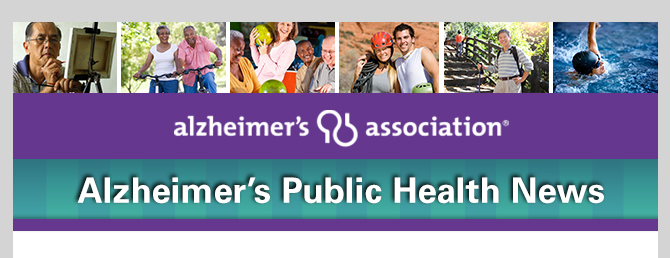



 A growing body of evidence shows that SCD is one the earliest warning signs of future cognitive impairment, including Alzheimer’s disease. Individual
A growing body of evidence shows that SCD is one the earliest warning signs of future cognitive impairment, including Alzheimer’s disease. Individual 


 This toolkit is framed around a series of six steps — Partner, Plan, Assess, Synthesize, Envision, and Communicate. Each step details how states can plan and conduct needs assessments to identify and respond to those with Alzheimer’s and other dementias as well as their caregivers.
This toolkit is framed around a series of six steps — Partner, Plan, Assess, Synthesize, Envision, and Communicate. Each step details how states can plan and conduct needs assessments to identify and respond to those with Alzheimer’s and other dementias as well as their caregivers.  Japanese seniors who were displaced from their homes and who lost contact with their neighbors after the 2011 tsunami were more likely to experience symptoms of dementia than those who were able to safely stay in their homes, according to a
Japanese seniors who were displaced from their homes and who lost contact with their neighbors after the 2011 tsunami were more likely to experience symptoms of dementia than those who were able to safely stay in their homes, according to a  Research like this reinforces the need for communities to incorporate the special considerations of people with cognitive impairment in their disaster preparedness planning. This
Research like this reinforces the need for communities to incorporate the special considerations of people with cognitive impairment in their disaster preparedness planning. This 
